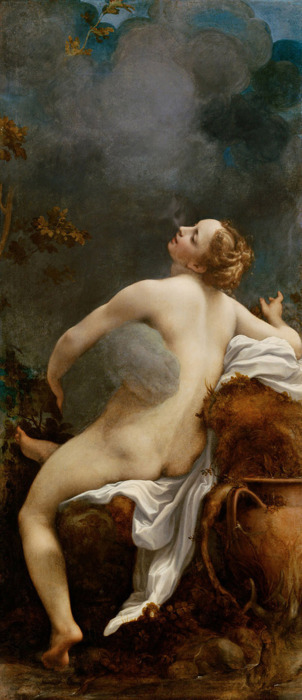Clouds are apparently all the rage these days: Cloud computing, cloud… something or other, and cloud… Well, if I couldn’t think of a second example I most likely won’t be able to think of a third. Also, I must confess that I have no idea what cloud computing is actually.
At any rate, those of you who live in the northeastern region of the United States, Britain, or even France probably know that at this time of year traditional clouds are also omnipresent. Indeed, I feel as if I have been gazing at the same drab, overcast sky for weeks on end. So heavy and unforgiving is the vista that there may as well be an immeasurable slab of slate suspended between the heavens and myself. The lack of sunlight and open sky is oppressive to me and causes my mind to meander down twisted paths. I begin to wonder, what if the clouds descended and tried to copulate with people?
Do not smirk, for it has happened! Not to me, and perhaps not literally. But observe, if you will, Correggio’s Jupiter and Io:
 |
| Antonio Allegri da Correggio, Jupiter and Io, c. 1532-1533; oil on canvas; Vienna, Kunsthistorisches Museum. |
Federico II Gonzaga, the duke of Mantua, commissioned this stunning painting to decorate his sumptuous villa, the Palazzo del Te. It was one of a quartet of works depicting the loves of Jupiter as told by Ovid in his Metamorphoses. Though Ovid relays the myth most famously (toward the end of Book I), Aeschylus also provides an account in his tragedy Prometheus Bound, from which I quote here:
Io: In my maiden chamber I was persistently visited by nocturnal visions which coaxed me in smooth words: “Most greatly blessed maiden, why do you remain a virgin so long, when you could have the greatest of unions? Zeus has been heated by a dart of desire coming from you, and wishes to partake of Cypris with you [Note: Cypris was the homeland of Aphrodite, the goddess of erotic love]. Do not, my child, spurn the bed of Zeus, but go out to the deep meadow of Lerna, among the flocks and cow-byres of your father, so that Zeus’ eye may be assuaged of its desire.”
(From Aeschylus, Prometheus Bound, lines 645-654.)
And she did! Ridiculous. I hope you’re taking notes, gentlemen. If you fancy someone, just sneak into your beloved’s bedroom while she’s asleep, badger her with your wish to fornicate betwixt the livestock, and it will be all go. Also, I suppose it helps if you happen to be king of the gods. In any event, Io went out the fields – according to Aeschylus she was sent there by her father in accordance with messages received from oracles, Ovid places here there by happenstance – and Jupiter descended upon her in the form of a cloud, both to hide Io and disguise himself from Juno (Hera to the Greeks), his jealous wife. However, Juno knew something untoward was going on and identified the unnatural mist as Jupiter. But, before Juno could catch him in the act, Jupiter transformed Io into a cow, albeit an exceptionally beautiful one, so as to hide her amongst the rest of the herd that occupied the field. Juno, still suspicious, spitefully asked Jupiter to make her a gift of the comely heifer. Jupiter had no choice but to comply. So that cloud copulation could not recommence, Juno placed Io under the watch of Argus, the hundred-eyed herdsman. Jupiter, seeking to release his love from this captivity - and probably in an attempt to have it off with her once more - had Mercury (Hermes to the Greeks) slay Argus. Juno observed this action of her husband as well, and sent a divine gadfly to sting Io perpetually, chasing her to the ends of the earth and back. In fact, the Bosphorus, the strait that divides Europe from Asia, is named after Io’s tortured flight, as the Greek bosporos translates roughly to “ox-passage.”
So, it all worked out in the end.
(Published originally on December 17th, 2011.)
No comments:
Post a Comment